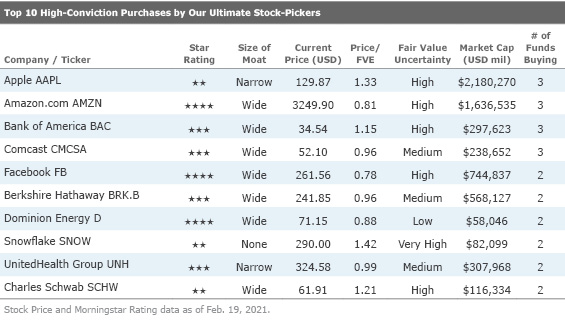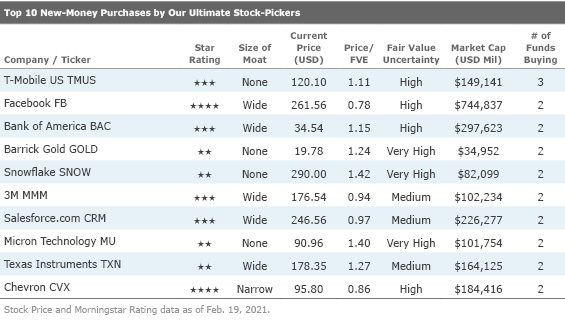Our Ultimate Stock-Pickers' Top 10 High-Conviction Purchases
Several managers see value in technology and financial services.
For roughly the past decade, our primary goal with the Ultimate Stock-Pickers concept has been to uncover investment ideas that reflect the most recent transactions of our “Ultimate Stock Pickers” in a timely enough manner for investors to get some value from them. In cross-checking the most current valuation work and opinions of Morningstar’s own cadre of stock analysts against the actions of some of the best equity managers in the business, we hope to uncover a few good ideas each quarter that investors can dig into a bit deeper to see if they warrant an investment. With 23 of our Ultimate Stock-Pickers having reported their holdings for the fourth quarter of 2020, we now have a good sense of the stocks that piqued their interest during the period.
Recall that when we look at our Ultimate Stock-Pickers' buying activity, we focus on high-conviction purchases and new-money buys. We think of high-conviction purchases as instances when managers have made meaningful additions to their portfolios, as defined by the size of the purchase in relation to the portfolio's size. We define a new-money buy strictly as an instance where a manager purchases a stock that did not exist in the portfolio in the prior period. New-money buys may be done either with or without conviction, depending on the size of the purchase, and a conviction buy can be a new-money purchase if the holding is new to the portfolio.
We recognize that our Ultimate Stock-Pickers' decisions to purchase shares of any of the securities highlighted in this article could have been made as early as the start of October, so the prices paid by our managers could be substantially different from today's trading levels. Therefore, we believe it is always important for investors to assess for themselves the current attractiveness of any security mentioned here based on myriad factors, including our valuation estimates and our moat, stewardship, and uncertainty ratings.
The last few months have seen the global economy recovering from the economic headwinds brought on by the COVID-19 pandemic. This market recovery has continued despite COVID-19-related numbers taking a turn for the worse toward the end of 2020. Even so, certain industries remain hard-hit (e.g., tourism, in-person shopping), though governments worldwide continue to take steps to mitigate the economic impact. The U.S. Federal Reserve has maintained the federal funds rate to 0.00%-0.25%, and the U.S. government has taken many drastic measures since then to cushion the blow on the economy, including stimulus programs for consumers, unemployment benefits, easing pressures on debt markets, and establishing the PPP facility to help small businesses. With a democrat in the Oval Office, we could expect these measures to continue as the American economy readies itself for a comeback. Similar programs have been implemented across Europe and Asia as countries seek to boost their economies. Amid all this volatility and uncertainty, our Ultimate Stock-Pickers have managed to find value in individual stocks in a wide range of sectors such as technology, communication services, financial services, and healthcare.
In the top 10 high-conviction purchases list, the buying activity heavily leaned toward the financial services sector, which received three high-conviction purchases this quarter. Technology and communication services were not far behind, with two high-conviction purchases each this quarter. Keeping with a trend we have witnessed over the years, nine out of 10 companies in the high-conviction purchases list received a wide or narrow economic moat from Morningstar analysts. The three names we find most interesting on the high-conviction purchases and new-money lists are narrow-moat rated Apple AAPL, no-moat rated T-Mobile TMUS, and narrow-moat rated Chevron CVX. Three money managers made high-conviction purchases of Apple. T-Mobile topped our new-money purchases list with three funds buying up the company despite not holding its shares in the previous period. Finally, Chevron had two new-money purchases to finish off 2020.

There was a low amount of crossover between our two top 10 lists this period, with three names appearing on both lists. This quarter, four stocks received three high-conviction purchases from our Ultimate Stock-Pickers. These names include Apple, Amazon AMZN, Bank of America BAC, and Comcast CMCSA. Three of these companies have wide moats, which indicates that money managers are putting down big bucks toward blue-chip stocks such as these in a period of uncertainty.
The top 10 new-money purchases list had strong representation from the technology sector, with four out of 10 firms on the list being tech companies. However, topping the list was T-Mobile, with three funds committing new dollars to the communications services company.

One company that particularly stood out for us was narrow-moat Apple, a company that attracted three high-conviction purchases the previous quarter. Apple currently trades at a 33% premium to Morningstar analyst Abhinav Davuluri's fair value estimate of $98.
Davuluri asserts that Apple's narrow economic moat stems from the combination of switching costs and intangible assets. The primary moat source, however, is the switching cost Apple customers face when trying to move out of Apple's ecosystem. This ecosystem that boasts both software and hardware components widens Apple's sphere of influence on the consumer. Apple's flagship product, the iPhone, illustrates these switching costs. Recent surveys have shown high satisfaction scores with the iPhone and low willingness to switch away from it.
Davuluri further contends that Apple's rich expertise in both hardware and software represents an intangible asset, one that other tech firms have struggled to replicate. With an eye on the future, Davuluri expects Apple to focus on newer software and services to augment customer experience and maintain its high retention rates. To that end, it appears that Apple's supplemental products and services, such as Apple Watch, iCloud, AirPods, etc., act as both additional revenue sources but also as enhancements that keep Apple's customers within its ecosystem. An excellent example of this phenomenon is Apple Watch, an accessory that by itself may not have a substantial impact on Apple's top line. Still, it keeps users locked into the Apple ecosystem as it integrates far better with an iPhone than it would with an Android device.
Apple's narrow moat may surprise some readers who would expect a wide moat for a company with a history of market dominance and a market cap of over $2 trillion. Davuluri counters this by pointing to Apple's short product cycles and competitors eager to eat into Apple's market share as primary reasons behind the narrow moat rating. It is also worth noting that many mobile device titans have fallen from the zenith of their market dominance due to their failure to keep up with smartphone innovation. Despite Apple's track record of innovation, Davuluri does not view Apple as immune to these pitfalls.
Our Ultimate Stock-Pickers see some value in the communication services sector with two high-conviction purchases and new-money purchases within the sector. No-moat T-Mobile topped the new-money purchases list with three funds buying into the firm despite not holding any positions in the company last quarter. The company currently trades at an 11% premium to Morningstar analyst Michael Hodel's fair value estimate of $108.
T-Mobile, after its acquisition of Sprint in 2020, now matches the scale of its larger rivals: AT&T T and Verizon VZ. With roughly 65 million postpaid and 21 million prepaid phone customers, T-Mobile provides service to nearly 30% of the retail wireless market. Despite the increased scale and improved cost position, Hodel does not view T-Mobile's business as one that warrants an economic moat.
The company has recorded an impressive turnaround over the past several years. Despite initially lagging behind AT&T and Verizon and recording significant customer losses, T-Mobile was able to improve service, deploy new technologies, and provide better geographic coverage and capacity. These improvements resulted in impressive customer growth for T-Mobile. The company has captured around 75% of all new postpaid phone customers added between 2013 and 2019 in the U.S. wireless market. Despite the increased customer additions, Hodel also notes the cost T-Mobile has incurred to attain this growth. Increased investments in spectrum and network equipment increased its invested capital base by more than $25 billion during this period. Despite its improved cost position, this factor has contributed to the firm being unable to earn returns on capital that exceed our estimate of its cost of capital.
Hodel believes that T-Mobile's acquisition of Sprint will leave the industry in a much healthier long-term position. However, as T-Mobile looks to decrease its own network operating costs, it faces a complex challenge. Hodel forecasts that eliminating costs will require a balancing act that will likely take several years to fully execute. He also expects T-Mobile to continue to earn returns on capital below its cost of capital for the first two years after the merger.
Our Ultimate Stock-Pickers also made two new-money purchases in narrow-moat Chevron, the second-largest oil company in the U.S. with exploration, production, and refining operations worldwide. Chevron currently trades at a 14% discount to Morningstar analyst Allen Good's fair value estimate of $111.
Allen Good believes that Chevron's narrow economic moat is built on the quality of the company's upstream portfolio. The company's upstream segment holds a low-cost position based on evaluating its oil- and gas-producing assets. Further, Chevron's greater exposure to liquids and liquids-linked natural gas production has produced impressive cash margins over the past half a decade and resulted in returns on capital employed of nearly 20%. Based on the company's fundamentals and upcoming growth opportunities, Good forecasts a midcycle operating margin of almost $30 per barrel of oil equivalent, the highest in its peer group.
Good sees Chevron's recent acquisition of no-moat Noble Energy as one that improves its low-cost Permian position and gives the company a new, large resource basin with Mediterranean natural gas reserves. Historically, Chevron has benefited from an oil-leveraged portfolio. With an eye on the future, Good expects Chevron to maintain its edge as it moves into the next phase of growth, one that seeks to leverage the company's large Permian Basin position. In the Permian Basin, Chevron holds 2.2 million acres, primarily in the Midland and Delaware basins. Chevron has added 92,000 acres adjacent to its current Permian position with the Noble Energy acquisition.
The pandemic has had a significant impact on valuations within the energy sector. With an increased emphasis on renewables, many investors have turned away from companies such as Chevron. The argument against oil assumes a global switch from oil to renewable energy, which would lower oil prices due to reduced demand. Good expects sustained lower oil prices, which would drive returns lower than they have been in the past. However, at the same time, he expects Chevron's underlying cost structure and capital efficiency to improve. These improvements stem from the 2014 collapse in oil prices, bringing about many changes to the oil industry and the company. Assuming $60/barrel of oil, Good expects these cost-cutting measures along with higher-margin volumes to lead to greater free cash flow after 2021.
Disclosure: Malik Ahmed Khan and Eric Compton have no ownership interests in any of the securities mentioned above. It should also be noted that Morningstar's Institutional Equity Research Service offers research and analyst access to institutional asset managers. Through this service, Morningstar may have a business relationship with fund companies discussed in this report. Our business relationships in no way influence the funds or stocks discussed here.
The author or authors do not own shares in any securities mentioned in this article. Find out about Morningstar’s editorial policies.

/s3.amazonaws.com/arc-authors/morningstar/4ef98a5a-6be5-4127-a335-3568837ad0cd.jpg)
/s3.amazonaws.com/arc-authors/morningstar/e03383eb-3d0b-4b25-96ab-00a6aa2121de.jpg)
/cloudfront-us-east-1.images.arcpublishing.com/morningstar/6ZMXY4RCRNEADPDWYQVTTWALWM.jpg)
/cloudfront-us-east-1.images.arcpublishing.com/morningstar/URSWZ2VN4JCXXALUUYEFYMOBIE.png)
/cloudfront-us-east-1.images.arcpublishing.com/morningstar/CGEMAKSOGVCKBCSH32YM7X5FWI.png)
:quality(80)/s3.amazonaws.com/arc-authors/morningstar/4ef98a5a-6be5-4127-a335-3568837ad0cd.jpg)
:quality(80)/s3.amazonaws.com/arc-authors/morningstar/e03383eb-3d0b-4b25-96ab-00a6aa2121de.jpg)